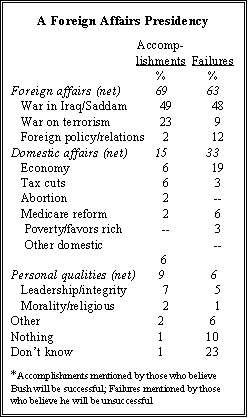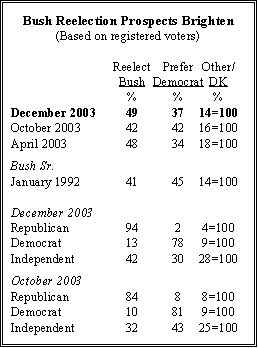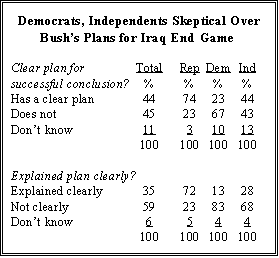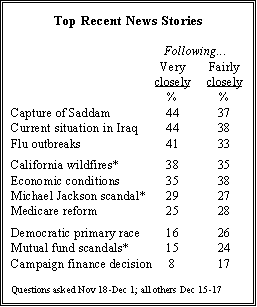Summary of Findings
 The public holds more positive opinions of President Bush and the decision to go to war in Iraq in response to the capture of Saddam Hussein. Bush has made significant gains with the public, and more importantly with voters. In historical terms, the president’s job approval gain (from 50% in November to 57% currently) is on par with Ronald Reagan’s gain following the 1983 U.S. invasion of Grenada, and the rally Bill Clinton experienced in the spring of 1995 after the Oklahoma City bombing.
The public holds more positive opinions of President Bush and the decision to go to war in Iraq in response to the capture of Saddam Hussein. Bush has made significant gains with the public, and more importantly with voters. In historical terms, the president’s job approval gain (from 50% in November to 57% currently) is on par with Ronald Reagan’s gain following the 1983 U.S. invasion of Grenada, and the rally Bill Clinton experienced in the spring of 1995 after the Oklahoma City bombing.
The rallies for Reagan and Clinton signaled sustained gains in popularity that led to their reelection victories. However, the larger rallies for other recent presidents in their first term Jimmy Carter following the 1979 Iranian hostage crisis and George H.W. Bush after the first Gulf War dissipated and both failed to win reelection.
In that regard, overall public opinion about the president and the war itself has not been fundamentally recast by Hussein’s capture. Support for the war has risen modestly, but public concern over American casualties in Iraq has increased as well.
 Half say the level of casualties is more than they expected, up from 42% in September. And while more Americans have a positive view of the situation in Iraq, just 28% think things there are going very well.
Half say the level of casualties is more than they expected, up from 42% in September. And while more Americans have a positive view of the situation in Iraq, just 28% think things there are going very well.
Two-thirds of Americans believe the United States made the right decision in going to war in Iraq, up from 60% in October. In addition, more now say the president has a clear plan to bring the situation in Iraq to a successful conclusion, though the public is split on this issue (44% say he has a clear plan, 45% believe he does not).
The latest nationwide survey by the Pew Research Center, conducted Dec. 15-17 among 815 adults, suggests that the staying power of the Bush rally is strongly linked to U.S. fortunes in Iraq over the next year. As in the past, the public is divided about the president’s overall record: 39% think that in the long run Bush will be a successful president, while 20% think he will be unsuccessful and 38% say it is too early to tell. However, both groups agreed on the primacy of Iraq to judgments about Bush’s performance. In an open-ended format, fully 49% of those who believe Bush’s presidency will be successful cited the war in Iraq as his greatest accomplishment. Conversely, about as many of those who take a negative view of Bush’s presidency (48%) cite the war as his biggest failure.
 Significantly, while more Americans back the decision to go to war, an increasing number also say it has helped in the broader struggle against terrorism. By more than two-to-one (59%-26%), people believe the war in Iraq has helped, not hurt, the war on terrorism. In September, there was a closer division of opinion on this issue (54% helped, 31% hurt). At the same time, however, the public continues to offer a mixed assessment of the how well the United States has taken Iraqi interests into account in rebuilding the country; 46% say it has, largely unchanged from three months ago (45%).
Significantly, while more Americans back the decision to go to war, an increasing number also say it has helped in the broader struggle against terrorism. By more than two-to-one (59%-26%), people believe the war in Iraq has helped, not hurt, the war on terrorism. In September, there was a closer division of opinion on this issue (54% helped, 31% hurt). At the same time, however, the public continues to offer a mixed assessment of the how well the United States has taken Iraqi interests into account in rebuilding the country; 46% say it has, largely unchanged from three months ago (45%).
Clearly, the immediate political impact of Hussein’s capture has been positive for the president. Bush has gotten as big a boost in his reelection prospects than he has in his overall approval rating. Among registered voters, he now leads an unnamed Democrat by 49%-37%. Moreover, satisfaction with national conditions, which stood at 38% in October the lowest mark in Bush’s presidency also has risen, to 44%.
Other Issues…
The survey also finds that a decade after the approval of the North American Free Trade Agreement (NAFTA), the public is deeply divided over the impact of major trade agreements, both on the country and on their own lives. The division of opinion on the impact of trade pacts on the country is illustrative: roughly a third say they have been a good thing (34%), about as many say they have been a bad thing (33%), and the same percentage (33%) did not offer an opinion.
And the public’s initial reaction to the massive Medicare prescription drug plan is favorable, although many Americans say they think the legislation will not go far enough in addressing prescription drug needs. A majority (55%) approves of the plan, but even more people (61%) say they think the drug coverage will be insufficient. Large majorities of Democrats and independents express that concern, but so do half of Republicans.

Long View of Bush Changes Little
President Bush’s approval rating now stands at 57%, up from 50% in October and November, and the highest rating he has received since July; 34% disapprove of his performance in office. While there remain vast differences between Democrats and Republicans in opinions about Bush, approval of the president increased a full 10 percentage points among Democrats since November; gains among independents were smaller.
The president has made bigger gains in approval among women than among men. Currently the gender gap in approval is very small just three points with 59% of men and 56% of women approving of Bush’s job performance. Approval among women is up 10 points since last month, while the gains among men are a more modest five points.
Despite the latest good news for Bush, there has been no increase in the percentage of Americans who say they expect Bush to be a successful president. About four-in-ten (39%) believe Bush will go down as a successful president, say he will be, which is virtually unchanged from October 2002 (40%), while 20% think he will be unsuccessful (up from 15% last year).
 Most Republicans (77%) expect the president to be successful, while pluralities of Democrats and independents (43% and 45% respectively) say it is too early to know. Only 18% of Democrats think he will be successful, and twice that number (37%) expect him to be unsuccessful. There is little gender difference in expectations.
Most Republicans (77%) expect the president to be successful, while pluralities of Democrats and independents (43% and 45% respectively) say it is too early to know. Only 18% of Democrats think he will be successful, and twice that number (37%) expect him to be unsuccessful. There is little gender difference in expectations.
The war in Iraq figures heavily in assessments of Bush’s presidency among both his supporters and his critics. Among those who expect Bush to succeed as president, nearly half (49%) say the war in Iraq has been the most important accomplishment of his presidency thus far. Nearly a quarter (23%) mention the war on terrorism. Other accomplishments such as the tax cut or Medicare reform are mentioned by 6% or fewer of those who judge Bush’s presidency as successful. Democrats and independents who expect him to succeed are just as likely as Republicans to single out the war in Iraq and the fight against terrorism as the president’s top achievements.
The war also is seen as Bush’s biggest failure, by those who believe his presidency will be unsuccessful. Nearly half of this group (48%) mentions the war in Iraq, while 12% mention foreign policy in general and 9% mention the war on terrorism. The economy is cited the president’s biggest failure by 19% of those who believe Bush’s presidency will be unsuccessful. Compared with those with less education, fewer college graduates mention the war as a notable failure and more mention domestic issues, including the economy.

Bush’s Reelection Bounce
With the capture of Saddam Hussein and an uptick in the number of people who see the war in Iraq going well, the political terrain has shifted in the president’s favor, at least temporarily. Bush now leads an unnamed Democratic opponent by a margin of 49% to 37% among registered voters; last month, the race was a 42%-42% dead heat. Bush’s advantage is now about the same as it was in April, around the time of the fall of Baghdad. Virtually all Republicans now support Bush (94%, up 10 points from October). Bush also gained 10 points since October among independents, a plurality of whom support the president’s reelection (42%, to 30% for a Democrat).
Democrats are less united 78% would support an unnamed Democratic candidate but show little change from October. Just 13% of Democrats favor Bush’s reelection, which represents little change since October (10%).
Satisfaction with the ways things are going in the nation has increased somewhat since Pew last measured it in October, but the public overall remains divided, with 44% satisfied and 47% dissatisfied. Satisfaction among Republicans has increased by 11 points ( to 71%) but remains low among Democrats (now 28%, up only five points). A majority of women are dissatisfied (52%), while only 41% of men feel this way.
Two-thirds Say War Was Right Decision
 Currently, two-thirds of Americans (67%) believe the U.S. made the right decision in going to war against Iraq, up from 60% in October. Support for the war has remained fairly steady since the summer, in spite of continuing U.S. casualties.
Currently, two-thirds of Americans (67%) believe the U.S. made the right decision in going to war against Iraq, up from 60% in October. Support for the war has remained fairly steady since the summer, in spite of continuing U.S. casualties.
Hussein’s capture appears to have had the biggest effect on how Democrats view the war. A majority of Democrats (56%) now say the U.S. made the right decision in going to war, while 40% disagree. In October, just 39% of Democrats felt the war was the right decision. There has been far less movement among independents, roughly six-in-ten independents backed the decision to go to war both in October and currently. Republican support for the decision to attack Iraq remains overwhelming (90% now, 85% in October).
There has been a comparable shift in opinion on whether the war in Iraq has helped or hurt the broader struggle against terrorism. Democrats, by 47%-39%, believe the war in Iraq has aided the fight against terrorism; that marks a change since September when, by 49%-36%, more Democrats felt it undermined the war against terror. By contrast, just over half of independents (53% now, 57% September) have consistently said the war in Iraq has helped in the struggle against terrorism.

But Casualties Still Worrisome
More Americans say the military operation in Iraq is going very well than did so in October (28% now vs. 16% in October), but the plurality view is that the military effort is going fairly well (47%). Just 22% say the war is not going well, down from 36% two months ago. And while increasing numbers of Republicans, Democrats and independents say the effort is going very well, the partisan gap in perceptions remains significant. Nearly twice as many Republicans as Democrats believe the military operation is going very well (42% vs. 22%).
Perceptions of the U.S. casualty toll in Iraq have not improved as a result of Hussein’s capture. Half of Americans say the U.S. has suffered more casualties than they expected, compared with 39% who say there have been fewer casualties than expected. In September, a 49% plurality said casualties had been less than expected.
An increasing number of Democrats say the U.S. toll in Iraq has been higher than they anticipated; 67% say that now, compared with 51% in September. Opinion has been more stable among independents and Republicans. There continues to be a sizable gender gap on this issue: 46% of men say there have been fewer casualties in Iraq than they expected, compared with only a third (33%) of women.

Divided Over Bush’s Iraq Plans
Just as many Americans believe the president lacks a clear plan for bringing the situation in Iraq to a successful conclusion (45%), as say he does have a clear plan (44%). Still, that reflects some movement in the president’s direction. In October, more said he lacked a clear plan for successfully concluding the war by a 54% to 35% margin.
As in the past, views on this issue are highly influenced by partisanship. Roughly three-quarters of Republicans say Bush has a clear plan for successfully exiting from Iraq, compared with roughly one-quarter of Democrats, while independents are evenly divided.
Partisan differences are even more pronounced over whether Bush has “explained clearly” his plans for exiting from Iraq. Most Americans (59%) say he has not explained those plans clearly enough, while 35% believe he has. This represents no significant change since October, when 63% said he had not clearly explained his plans for bringing the situation in Iraq to a successful conclusion and 32% believed he had. By a more than three-to-one margin (72%-23%), Republicans believe the president has clearly articulated his plans and by more than six-to-one (83%-13%), Democrats say he has not.
Iraqis Seen as More Supportive
 The public continues to take a measured view of the U.S. rebuilding effort in Iraq. Just under half (46%) say the U.S. and its allies have done at least a good job in taking the needs of the Iraqi people into account, but nearly as many (43%) rate that effort as only fair or poor. This view has not changed materially since September, when 45% said the allies were doing an excellent or good job of addressing the needs of Iraqis and 46% said they were not.
The public continues to take a measured view of the U.S. rebuilding effort in Iraq. Just under half (46%) say the U.S. and its allies have done at least a good job in taking the needs of the Iraqi people into account, but nearly as many (43%) rate that effort as only fair or poor. This view has not changed materially since September, when 45% said the allies were doing an excellent or good job of addressing the needs of Iraqis and 46% said they were not.
However, there has been an increase in the number of Americans who say that most people in Iraq support America’s policies in Iraq. Nearly half (47%) express that view today, while 34% say most Iraqis oppose U.S. policies. In September these figures were nearly the reverse, a plurality of Americans (47%) felt that most Iraqis were opposed to America’s policies there while 39% saw Iraqi support.
Hussein’s Capture: Big Story, Not Biggest
 While Hussein’s capture drew intense news coverage, the public’s attention to the story was not out of proportion with their general, day-to-day interest in news from Iraq. Every respondent had heard about Saddam’s capture, and 44% say they followed reports about the capture of Saddam Hussein very closely. Attention to Hussein’s capture was no higher than general interest in news about the current situation in Iraq (44% following very closely). This level of public attention to news about Iraq is in line with polling conducted since the summer, and there has been no spiked in interest with news of Hussein’s capture.
While Hussein’s capture drew intense news coverage, the public’s attention to the story was not out of proportion with their general, day-to-day interest in news from Iraq. Every respondent had heard about Saddam’s capture, and 44% say they followed reports about the capture of Saddam Hussein very closely. Attention to Hussein’s capture was no higher than general interest in news about the current situation in Iraq (44% following very closely). This level of public attention to news about Iraq is in line with polling conducted since the summer, and there has been no spiked in interest with news of Hussein’s capture.
While public attention to this story was high, interest levels fall short of a number of other recent news events. The story garnered about as much public attention as the killing of Hussein’s sons over the summer (45% followed very closely). It also is comparable to the disaster involving the space shuttle Columbia disaster (46%) and the November 2001 anthrax scare (47%), in terms of public interest. Notably, the capture of Hussein has garnered much less public interest than the Littleton, Colorado school shootings in 1999 (68% followed very closely), or the sniper shootings in the Washington, D.C. area last summer (65%).
 Six-in-ten say they first heard about Saddam’s capture from television. This is somewhat lower than the 73% who first heard about the start of the war in Iraq from TV in March, and probably reflects the timing of the news the first reports came early on Sunday morning. Nearly a quarter (22%) say they first heard about the capture from talking with others, either in person (11%) or over the telephone (11%). As was the case with the beginning of the war in Iraq, more people cited cable TV networks as their first source than network news or local news.
Six-in-ten say they first heard about Saddam’s capture from television. This is somewhat lower than the 73% who first heard about the start of the war in Iraq from TV in March, and probably reflects the timing of the news the first reports came early on Sunday morning. Nearly a quarter (22%) say they first heard about the capture from talking with others, either in person (11%) or over the telephone (11%). As was the case with the beginning of the war in Iraq, more people cited cable TV networks as their first source than network news or local news.
While the timing of news events clearly plays a major role in how people first hear about them, the Internet has grown as an initial source of news about major stories. Almost no one reported first learning about the 9/11 attacks online (1%), but that increased to 3% who said they first learned of the start of the Iraq war from t
he Internet. In the current survey, 6% of respondents say they first heard the news of Hussein’s capture over the Internet.
Beyond Hussein: Other News
 Public interest in news about outbreaks of the flu and a national shortage of flu vaccinations is nearly as high as attention to news of Hussein and Iraq 41% say they have followed this news very closely, and another third have followed fairly closely. This is comparable to public interest in news about the spread of SARS from Asia earlier this year (39% followed very closely), and both are among the most followed news stories of 2003. Overall, women paid somewhat more attention to this story than men (46% vs. 36% following very closely). Parents with children at home expressed only slightly more interest in this story than non-parents of a comparable age (41% vs. 34% very closely).
Public interest in news about outbreaks of the flu and a national shortage of flu vaccinations is nearly as high as attention to news of Hussein and Iraq 41% say they have followed this news very closely, and another third have followed fairly closely. This is comparable to public interest in news about the spread of SARS from Asia earlier this year (39% followed very closely), and both are among the most followed news stories of 2003. Overall, women paid somewhat more attention to this story than men (46% vs. 36% following very closely). Parents with children at home expressed only slightly more interest in this story than non-parents of a comparable age (41% vs. 34% very closely).
Nearly as many (38%) followed news about damage caused by California wildfires in November very closely, and not surprisingly, interest was far higher in Western states (51%) than in the rest of the nation (34%). Public interest in reports about the condition of the U.S. economy have remained high all year. Currently, 35% report following economic news very closely; interest has ranged from 32% to 42% throughout the year.
About three-in-ten Americans (29%) reported following news about recent charges of child molestation against Michael Jackson very closely. This is slightly higher than interest in the previous major scandal involving the pop singer in late 1993, which just 19% followed very closely. African-American respondents were significantly more interested in this news story than were whites (42% vs. 26% followed very closely.)
The Medicare reform legislation recently signed into law was followed very closely by a quarter of Americans. Another 28% say they followed this news fairly closely, while nearly half followed news about Medicare reform not too closely (22%) or not at all (23%). While older Americans tend to follow all types of news more closely than youngsters, the gap on this issue is particularly large, with people age 65 and older more than four times as likely as those under age 30 to be following this news very closely (45% vs. 10%). African-Americans also were significantly more interested in this story than whites (37% to 24%). Aside from these age and racial disparity, however, public interest did not vary across the population.
Just 15% of Americans followed news about Wall Street scandals involving mutual fund managers in November. Twice as many (33%) said they did not follow this story at all closely. By comparison, roughly three-in-ten were following news about WorldCom and other corporate scandals very closely in the summer of 2002, as well as the Enron scandals earlier that year.
People who have mutual fund investments aside from those in retirement accounts a group that comprise about 30% of the public were much more likely than those with no mutual fund investments to follow this story very closely (22% vs. 12%). Yet people whose retirement investments include mutual funds showed no greater interest in this story than those with no mutual fund investments at all (12%).
Despite its impact on the election campaign, just 8% followed news of the Supreme Court decision upholding campaign finance reform legislation very closely. Most people followed this not too closely (28%) or not closely at all (45%). Public interest in the race for the Democratic presidential nomination remains fairly low just 16% are following election news very closely while most are paying little (27%) or no (30%) attention. Democrats are slightly more interested in primary race than are Republicans (20% very closely vs. 13% among Republicans). The gap is more striking at the other end of the spectrum Republicans are nearly twice as likely as Democrats (36% vs. 19%) to say they are not paying attention to campaign news.


